Paul Keith Hymnology
OK, so let's talk about hymns in the church. An as an introduction to that subject I think it is a good idea to first talk about worship itself. Let's look at this first slide.
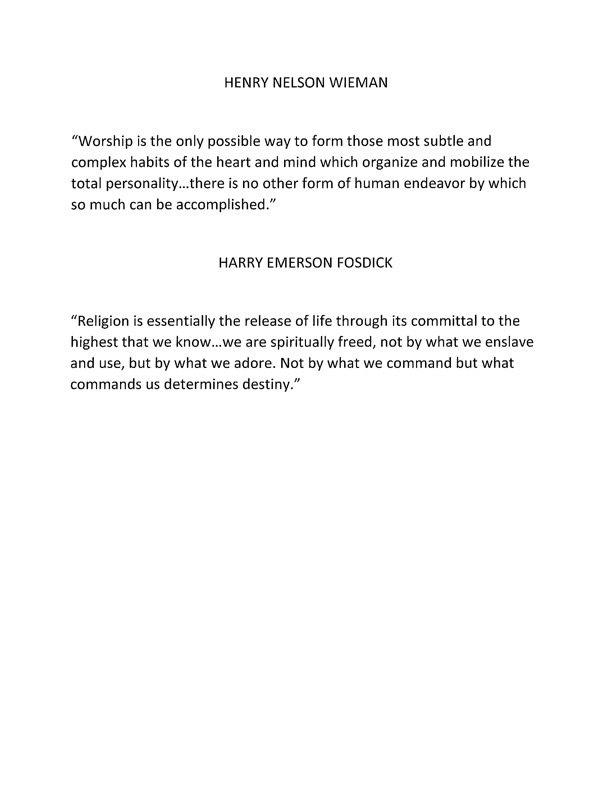
One of the most perspicacious quotes that I have ever heard on the subject of worship is a very brief one by a man named Henry Nelson Wieman who was a Presbyterian pastor actually and later a professor at the Chicago divinity school who said "Worship is the only possible way to form those most subtle and complex habits of the heart and mind which organize and mobilize the total personality ...there is no other form of human endeavor by which so much can be accomplished."
So just think about that for a moment, think about maybe one of the most memorable worship services you've ever been to and maybe by 4:00 o'clock on Sunday afternoon you're still motivated and stimulated by a worship service that you went through that morning and what was it about it that made it so special what made it stand out from from all the others and I know in my case it's both a matter of the the mind and the heart it's something more than the sum of its parts. I guess where it wasn't just the sermon the sermon was let's say insightful and and inspiring but there there was music in the service and hymns that coordinated with the theme of the sermon that brought to life the message of the day and that really left me feeling elevated. If that has happened to you you might be able to relate to this worship is the only possible way to form those most subtle and complex habits of the heart and mind which organize and mobilize the total personality when music and words are brought together in hymns they too are more than the sum of of the parts.
One of the great composers of the early 20th century, Gustav Mahler, said that if you can say it in prose then say it in prose, but if you can't say what you want to say in prose then say it in poetry, and if you can't say it in poetry then compose music and if there are cases where even music won't say all we want to say and so we add better poetry back to the music and hopefully that gets us to a fourth level and that's where the best hymns can take us.
The greatest hymns are where you have excellent religious poetry combined with music that carries the words into your heart and mind.
But there aren't that many great hymns. If you compare the total number of hymns ever composed to the number of hymns that actually succeed in doing that. It's a small percentage, but it's still a very worthy endeavor. A worthy endeavor to sing them, to use them in worship, and it's a worthy endeavor to try to compose new ones that that reached that level of inspiration and and transformation. And we'll get more into that in more detail but I just wanted to say that at the beginning of today's class that's to me is the the purpose of hymns and what makes them the best of them so such worthy elements of Christian worship.
But I would also like to read another appropriate quote. From Harry Emerson Fosdick. So let's return to the first slide once more:

Fosdick was the pastor of the Riverside church in New York City in the late first half early second half of the 20th century and he wrote "Religion is essentially the release of life through its committal to the highest that we know... we are spiritually freed not by what we enslave and use, but by what we adore Not by what we command but by what commands us determines destiny".
And that is that's another thought that leads us to another level - that hymns can play and elemental part in getting us to hymns have been used for for in a variety of ways in Christian history. And so I want to just give you sort of a basic view over the 1st 2000 years of Christian history for starters just to to to give you some mileposts in your mind.
The first period and the earliest hymn actually written that we have goes back to the three hundreds and as many of you probably know the the Council of Nicaea was in the three hundreds when Constantine was emperor and made Christianity the legal religion of the empire. There obviously was Christianity before the three hundreds and it is believed that the hymn I'm just about to read to you - and do not worry, I will not do too much reading of hymns but only to make points with you.
One of the earliest hymns - a brief hymn - but I wanted to use it to point out something. There is no slide for it but I will just read it. It is possible that this actually goes back to the one hundreds or the two hundreds but it was a well known him by the three hundreds in in southern Europe and the Middle East. Listen:
"Christ gladdening light of holy glory. Glory of God heavenly Father immortal. The holy blessed one our Lord Jesus Christ, we are now come to the peaceful hour of sunset, we see the star of evening shine, we sing to the Father, the Son and the Holy Spirit. One God, you are worthy at all times to be praised and honored with pure and pious songs. God's only son our only lifegiver where for all the world gives glory to you its master."
Well it is interesting just to hear how they expressed the faith at that time. It is also interesting to notice how much the hymn is focused on God and Jesus and a little bit on the Holy Spirit as opposed to being focused more on us and our own needs and our own desires. That's the difference between objective hymns and subjective hymns. Objective hymn texts speak of God and his purposes and his nature and in what he's doing in the world, his fight with evil in the world. Subjective hymns at the other extreme. They are all about us and our desires and our needs and wants and and so forth and what you'll see it's interesting because the first hymn is very objective it's very much focused on God but what we'll see as we talk more about hymns is that they move historically in the subjective direction, in other words they include us more they talk more about our needs, passions, and and what we're looking for from God and it's it's a question of how well that's done. The object of hymns is is first and foremost praise to God so they should be objective but they can't be all one sided in that way they need to bring us into the picture in order to to give what people are seeking from religion from the Christian faith.
Another thing to notice about that first early hymn is that it is very trinitarian. It is talking about the Father, the Son, and the Holy Spirit. This was well before the Nicene creed and the Apostles creed and there was a lot of disagreement about whether Jesus was the equal of God or whether he was a created being beneath God the Father.
Not only that but you may have heard of the huge debate between Arius and Athanasius, both of North Africa (Alexandria). Arius had a large number of followers who believed that Jesus was not God but was anointed of God and certainly to be to be elevated, but not God himself, there was only one God, the Father. And they had hymns that expressed that view. Other early church fathers of course were on the other side of that argument and they had hymns that expressed the opposite view.
In fact I've I've even read that there were fishermen would be whistling the tunes of the hymns that express those various views. You might be surprised that fisherman of all people might be aware of these abstruse arguments but apparently a lot were and were a lot of bright people out there some of them were fisherman but this hymn that I just read to you was in actuality (if you remember the movie Deliverance there were the dueling banjos) were dueling hymns and so that was maybe the first or the second reason for hymnody was was to make the illogical points and get people on your side so I thought that hymn was interesting for for a couple of reasons.
But moving through this history after Constantine had made it so that there was a one party line as it were about Jesus not much happened in the way of hymnody for quite a while. Ambrose who was Bishop of Milan wanted congregations to sing and tried to develop a type of chant of we think of Gregorian chant but there's also Ambrosian chant named after Ambrose and his followers and his musicians and he encouraged that, but the hymns that they would have sung would have been responsorial, and so in worship they would have had a music leader who would have sung psalms or or for some early verse early poetry and they would have repeated what what they were led to saying by a music leader.
But basically from 400 to about 1400 or 1500 C.E. not much happened in the way of the development of hymns except in the monasteries and a lot of the worship in monasteries was presented to other monks and obviously there was some in churches as well but it was sung by monk choirs to congregations and congregations basically listened so there wasn't participatory singing until very late and again it would have been responsorial so hymns as we know them started to appear with the Reformation which of course was a huge trial for the church.
The Reformation was basically a fight for human rights, aimed to destroy the tyranny of the Catholic priesthood and it was to give people the right to a private religion and not be treated as children which is the way the church basically had treated them with very little participation, very little free thought and hymns became a vehicle for allowing freedom. This freedom of thought and this freedom of devotion, this devotional approach to God. But the truth is there were multiple reformations, there wasn't just a single reformation, there was a German reformation, there was a Swiss reformation, there was a Dutch reformation there was an English and Scottish reformation and they all had somewhat different histories.
The Genevan reformation under Calvin basically took the psalms and set them to music and in French and and it's something called the Genevan Psalter and the Genevan Psalter was basically a melody line and the the given Psalm versified to fit into the music that was written. Calvin didn't allow any organs or musical instruments in the church and he didn't allow any harmonies everyone had to sing the melody and they had to sing it very slowly because Calvin did not want anyone to get particularly excited by the music, he simply wanted to use the music to drill the words into the mind and so it would have been sung so slowly that you can't relate to it musically, painfully slowly so that was his desire he also wanted the hymnals to be printed and used in homes and Calvin was all for that and if anybody had a flute or something at home and could use it then he that that was OK but not in church. But the important thing to remember is that the words were all Psalms and because it was thought that that that's you know the Psalms are kind of the original hymns that's all means song and there you have 150 of them in the Bible so set them to music.
The German reformation of course is the most famous of the reformation's, Martin Luther and his was the most political of all the the reformations. Maybe that's an overstatement but the the fight with the Catholic Church was was the most intense in Germany and Luther's writing was used to inspire not only faith in God the almighty but but also to rouse the faithful in the struggle with the Catholic Church.
"A mighty fortress is our God a bulwark never failing, our helper he amid the flood of mortal ills prevailing, for still our ancient foe, does seek to work as well as craft and power are great and armed with cruel hate on earth is not as equal the Prince of darkness grim, we tremble not for him his rage we can endure well the Prince of darkness."
Notice that Grimm was not just the devil it was also the Pope and that was a message that was not lost on the German laity in church but Luther wrote I think 37 hymns or something, many with the music as well as the words and that was about all he thought that the Lutherans needed along with all the theology that he had given them and the hymns were objective very very objective in their text so very much focused not on the needs and and of of the individual but on God and his purposes in the world and so forth.
But the the English story is probably to us the most interesting because so many of the hymns that we sing today come out of Great Britain and Scotland but before we move to that let me look at let me point out a couple of German hymns. Let's look at the next slide.
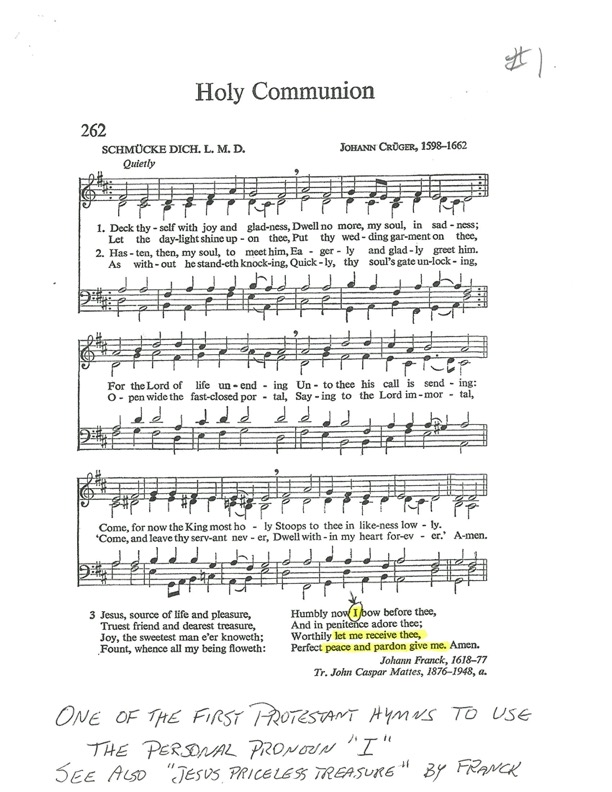
“Deck thy - self with joy and gladness”. I just wanted to point out a couple of things. None of us are used to using hymnbooks anymore and so but most of the people in this class can probably remember seeing actual printed pages of hymns in the past and there's a lot of information on each page of you know for each hymn and what this tells you obviously it gives you three verses to go with the melody and they and the harmony but up in the right hand corner it tells you the composer of the music in this case Johann Kruger he was one of the great German hymn writers and his dates and then on the left it usually gives you the the name of the text writer and but in this case the text writer is down at the bottom underneath the third verse but one of the things I wanted to point out well and was that this was one of the first Protestant hymns to use the personal pronoun "I" and there it is down at the bottom. I've drew a little arrow and you can see how humbly now I bow before thee and impenitence adore thee worthily let me receive the perfect peace and pardon give me so that's a plea and it's a subjective element that's just being introduced along with some other earlier ones as well but that's one of the first German hymns to use the pronoun I.
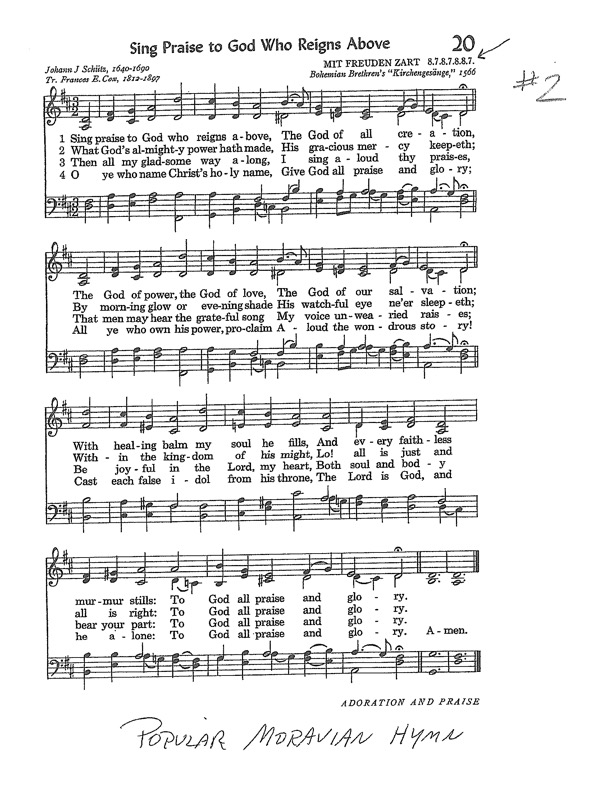
Moving to the next slide and "Sing praise to God who reigns above". I think we we all probably know that seeing praise to God who reigns above, the God of all creation we've we've sung that a lot over the years in church and if you look up in the right hand corner where I've drawn another arrow you'll see a bunch of numbers 8.7.8.7.8.8.7, and you may have noticed those in earlier years in your life when you were singing out of a hymn book and thought "what the heck do those numbers mean" and what they stand for is the meter of the hymn the meter meaning how many syllables per phrase, so if you if you count sing praise to God who reigns above that's eight syllables in the first phrase therefore you see an 8 as the first number the second phrase. The God of all creation is shown that's seven syllables so there's a seven and then the next line the same thing 87 and then there's the next part is 887 so there's another phrase stuck in there and and then finally 87. So what that enables you to do, it tells you what texts will fit that tune so there you see the text there saying praise to God who reigns above, but there could easily be other texts and other poetry that happen to have that same 8787887 syllables per phrase pattern that could be substituted for that particular text and why would a music director want to do that, why would you wanna switch texts from tunes well you might have a sermon coming that week that's on a particular theme and you know a text that will fit the theme but you want it to be sung too a tune that the congregation is already familiar with and you're worried that if you sing it to a different tune nobody sings and so Emily Craven does this all the time. She switches texts with tunes so that first of all she goes to great effort to coordinate the texts with with the sermon and to coordinate the anthem message with the sermon and so that everything is coordinated but she will frequently use this technique and if you if you look in the back of an old hymnal you'll see that there are metrical indexes that show all kinds of different metrical patterns and one of the reasons why this is so important is because when they were metrasizing (if that's a word) the Psalms they had to come up with all kinds of different meters. The psalms are not all nicely arranged in in a four stanza versus to fit our hymns they had to be cut and chopped and lengthened and organized in such a way that they could be put to music and sung in verse style and that had a great impact on why it took a long time to write enough hymns to have complete hymnbooks. So that's getting down into the weeds I know and I hope it's not boring you but but what the long and short of the the psalters is that the English had a Psalter as well with all 150 Psalms turned into hymns.
And one of the most well remarkable hymn writers in English was a man named Isaac Watts which you probably may have heard of. He was a highly intelligent and bookish young man he grew up in a devout congregationalist family. His father was an elder and at a fairly young age Watts wanted to know why hymns all had to be settings of Psalms from the King James version of the Bible set in meter couldn't people sing and why couldn't there be more hymns about their personal savior Jesus Christ. Shouldn't the Psalms be imitated in the language of the New Testament instead of the Old and why not base hymns on other scriptures besides the Psalms and he told his father this and his father said well why don't you write some and he wrote later in life.
Watts wrote did he saw the dull indifference, the negligent and thoughtless error that sits upon the faces of a whole assembly while the Psalm is upon their lips and that might even tempt the charitable observer to suspect the fervency of their inward religion, so one of his first hymns was "When I survey the Wondrous Cross which we all know and love" and put in very decent poetry. It wasn't the greatest poetry in the world but very elevated language and between the ages of 16 and 35 he wrote over 360 texts, including "Joy to the World" and many many other hymns. In the 1700s he and Charles Wesley were the two greatest hymn writers in the English language. One of the things he did was to paraphrase. Let's look at that on the next slide:
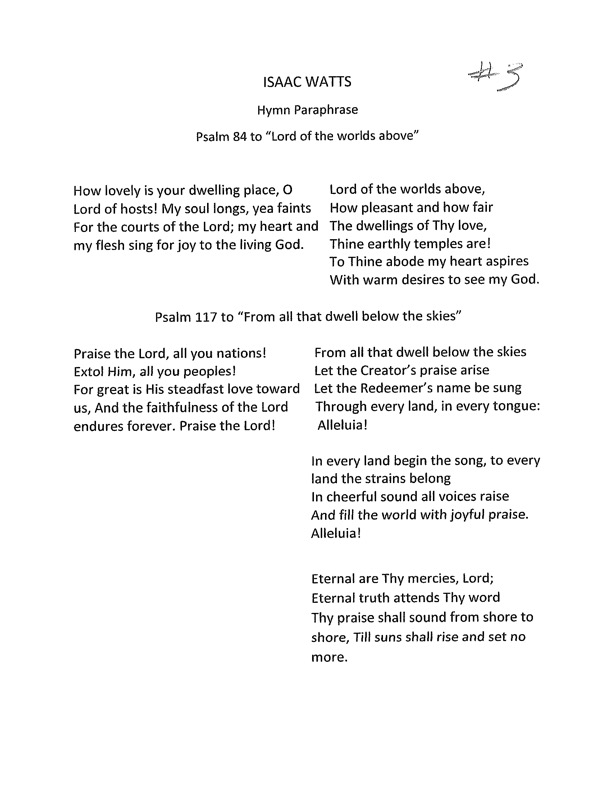
Here's an example of a pair of a Watt's paraphrases . If you look at Psalm 84 and read "How lovely is your dwelling place O Lord of hosts My soul longs yay faints for the courts of the Lord my heart and my flesh sing for joy to the living God."
Watts turned that into "Lord of the world above, how pleasant and how fair the dwellings of our love Thine earthly temples are to Thine abode my heart aspires with warm desires to see my God". So my soul longs yet faints becomes my heart aspires with warm desires. So he adds a lot of imagination and color to the Psalms and expands them and so frequently we often think of a paraphrase as a shortening of something else but it's not always a shortening. It's a putting in a different words.
the next one there is Psalms 117 you see is fairly short there in that in that verse but Watts expands it into three verses and again adding color and imagination that the people that he was accusing of sitting there without inward fervency could perhaps relate to in a more vivid way and you'll notice how the poetry adds to the believability of the message. We can reach heights of spiritual inspiration unattainable by any other means short of of a direct experience of the Holy Spirit.
Watts thought that Charles Wesley was actually a better hymn writer than he was. Charles Wesley was the brother of John Wesley who was the founder of Methodism and in the 1700s life in England was in a word terrible. It was widely regarded to be the worst place in Europe to live. It was filthy, covered with about 1/4 of an inch of of coal dust, full of factories, the working working conditions in the mines and the mills were terrible, where wretched crime and absenteeism were rampant, pay was poor, injuries were frequent and if you've ever heard William Blake's Jerusalem song he refers to the dark satanic mills and that's the time of Charles and John Wesley so the entire working class was dirty, poor, profane, and inevitably cheap drunk on cheap gin. ( actually the the rich were drunk too but on Sherry imported from France) but the Wesleys succeeded in propounding a method for raising people up through sobriety, cleanliness, godliness, and personal piety, loyalty and dependability. They succeeded in setting peoples eyes on things above and later they exported their method to US after the colonies gained their independence. They invented the phrase "cleanliness is next to godliness" and a lot of their hymns inspired people to really change their lives and brought a lot of people up and it's safe to speculate that Methodism wouldn't have gotten as far as it as it did without Charles Wesley's hymn poetry. He was an inveterate poem writer. He wrote many poems every day, not all hymns but sometimes just describing the things that were occurring in his life.
As an example, one time he went to a a funeral of a young man who apparently had an angelic look on his face and he wrote a little poem on the lovely appearance of death. "No sight upon earth is so fair, not all the gay pageants that breathe can with a dead body compare". So it would not make a a very good hymn but his poetry was was unceasing, it never stopped and even his his sister Hedy wrote a poem after John John had tried to be a minister to a church out in the bogs of eastern England and near Epworth and for several years and didn't have much success there and just finally left and never had anything to do with parish ministry again and his sister hedy who had been out there with him wrote a poem also about the people at after Epworth out in the bogs hi births and virtue equally they scorn as the assets dull on dung hills born impervious as the stones their heads are found their rage and hatred steadfast as the ground I thought that was amusing when I came across that so one gathers that the the intellectual lights in the bogs were not very bright but then again they probably had a lot to complain about too but to give you an example of Wesley Charles wesley's hymns he wrote they say you read anywhere from 6000 to 9000 hymns but again I'm sure not all of them were were hymns but some of the ones the best known that we that we know are Hark the Herald Angel Sings, Christ the Lord is Risen Today, Jesus Lover of my Soul, Over 1000 tongues to Sing, and Love Divine all Loves Excelling.
Read and enjoy "Love Divine all Loves Excelling":
Love divine, all loves excelling,
joy of heaven, to earth come down;
fix in us thy humble dwelling,
all thy faithful mercies crown.
Jesus, thou art all compassion,
pure, unbounded love thou art;
visit us with thy salvation,
enter every trembling heart.
Finish, then, thy new creation;
pure and spotless let us be;
let us see thy great salvation
perfectly restored in thee:
changed from glory into glory,
till in heaven we take our place,
till we cast our crowns before thee,
lost in wonder, love and praise.
That is one of my favorite hymns - it's just wonderful poetry. It's a mix of objective and subjective. It's the right balance. I can't think of a only some other Wesley hymns that approach that which Henry Wieman was talking about regarding the subtle influence on the heart and mind that brings us to our best.
And one of Wesleys hymns, the one that Isaac Watts loved and said was worth all of Watts own 360 hymns was called "Come, O Thou Traveler Unknown". This is well known to Methodist congregations, it's sometimes called "wrestling Jacob" after Jacob wrestling with the Angel in Hosea. Read that story in Hosea and Wesleys poetry seems even more powerful. Let's just read just a few verses and see how how intimate and yet universal this is:
Come, O Thou Traveler unknown,
Whom still I hold, but cannot see;
My company before is gone,
And I am left alone with Thee.
With Thee all night I mean to stay
And wrestle till the break of day.
I need not tell Thee who I am,
My misery, or sin, declare;
Thyself hast call’d me by my name,
Look on Thy hand and read it there.
But who, I ask Thee, who art Thou?
Tell me Thy name, and tell me now!
In vain Thou strugglest to get free,
I never will unloose my hold;
Art Thou the Man that died for me?
The secret of Thy love unfold;
Wrestling I will not let Thee go,
Till I Thy name, Thy nature know.
Wilt Thou not yet to me reveal
Thy new, unutterable name?
Tell me, I still beseech Thee, tell,
To know it now resolv’d I am;
Wrestling I will not let Thee go
Till I Thy name, Thy nature know.
’Tis all in vain to hold Thy tongue,
Or touch the hollow of my thigh;
Though every sinew be unstrung,
Out of my arms Thou shalt not fly.
Wrestling I will not let Thee go,
My strength is gone, my nature dies,
I sink beneath Thy weighty hand,
Faint to revive, and fall to rise;
I fall, and yet by faith I stand,
I stand, and will not let Thee go,
Till I Thy name, Thy nature know.
’Tis Love, ’tis Love! Thou diedst for me,
I hear Thy whisper in my heart.
The morning breaks, the shadows flee:
Pure universal Love Thou art;
To me, to all, Thy mercies move—
Thy nature, and Thy name is Love.
My prayer hath power with God; the grace
Unspeakable I now receive;
Thro’ faith I see Thee face to face,
I see Thee face to face, and live;
In vain I have not wept, and strove,
Thy nature, and Thy name is Love.
Contented now upon my thigh
I halt, till life’s short journey end;
All helplessness, all weakness I,
On Thee alone for strength depend,
Nor have I power from Thee to move;
Thy nature, and Thy name is Love.
Lame as I am, I take the prey,
Hell, earth, and sin with ease o’ercome;
I leap for joy, pursue my way,
And as a bounding hart fly home,
Through all eternity to prove
Thy nature and Thy Name is Love
Well the love of God was a strong strong message in in the Methodist Church and still is and and obviously strong in Wesley's personal theology. I have not read any of his books but an inclined to study more a man who can write like that!
Now there is another question that you might have about hymnody. And that is how do they get married up because it's usually it's usually not the same people who write the text who write the songs.
Often the hymn tunes will come from art songs, ballads, and drinking songs over the centuries. Many different sources. And sometimes from church musicians who are specifically writing to set a text to music. I personally have written one and I will use it as an example of how this works. So I want to give you an example of how that might happen. Let's look at the next slide. It is a hymn that I wrote.
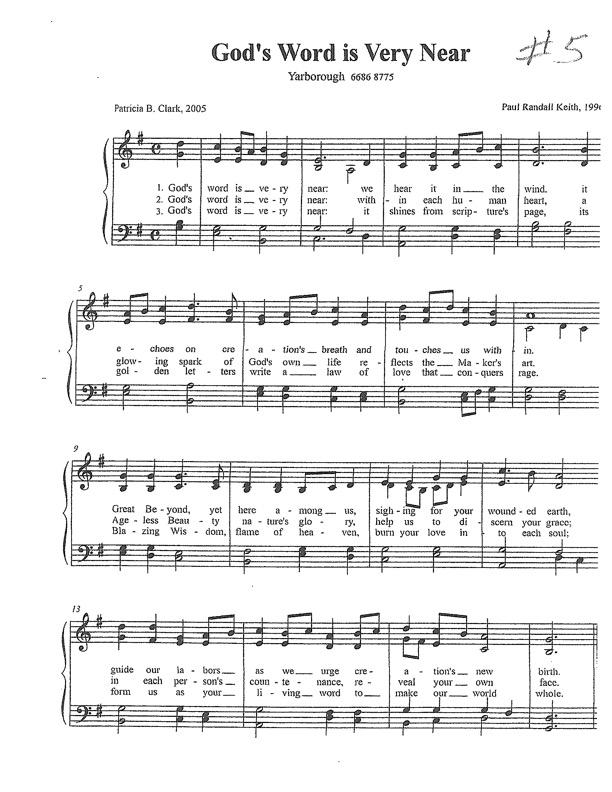
Unfortunately I cannot play it for you today, but trust me - it is a great tune. But I could not find any text that had the meter that my hymn had! If you look up underneath the title God's word is very near, I named it Yarborough, that's the name of the tune and I named it after the street that I lived on at the time and I thought it sounded kind of English and the tune is is kind of inspired by Anglican hymnody so that's English that's why I named it Yarborough but you'll notice the numbers after that there and trust me when I tell you that those are an odd pattern. There is no other pattern. I couldn't find in any in book when I was searching for a text that might fit it but it so happened that when I wrote this that we had a very fine hymn writer Patricia Clark living right here in Austin and she's a woman who was outstanding, a writer of religious poetry and she's had many many hymns published in different denominational hymnals and so I asked her if she could write some some text to my hymn and she said, well let me look at it, and she did, she wrote a three verse hymn inspired by Bonhoeffer but let me just read you the last verse.
God's word is very near, it shines from scriptures page, it's golden letters write a law of love that conquers rage, blazing wisdom, flame of heaven, burn your love into each soul, form us as your living word to make our world whole.
and I was deeply moved to have her write poetry of that quality for my hand but I can tell you that it's much easier to write the words first and set the music to the words than the other way around the way that I did it.
That is about it, but I did want to show one more thing on this last slide. Some examples of subjective hymns, the ones that focus the internal spiritual experiences of the worshipper to illustrate how different they are from objective hymns. The examples shown rarely allowing the attention to stray from the self so these would be examples where the words are not really worthy of inclusion in a serious worship service being so subjective that they they focus almost totally on on the self.
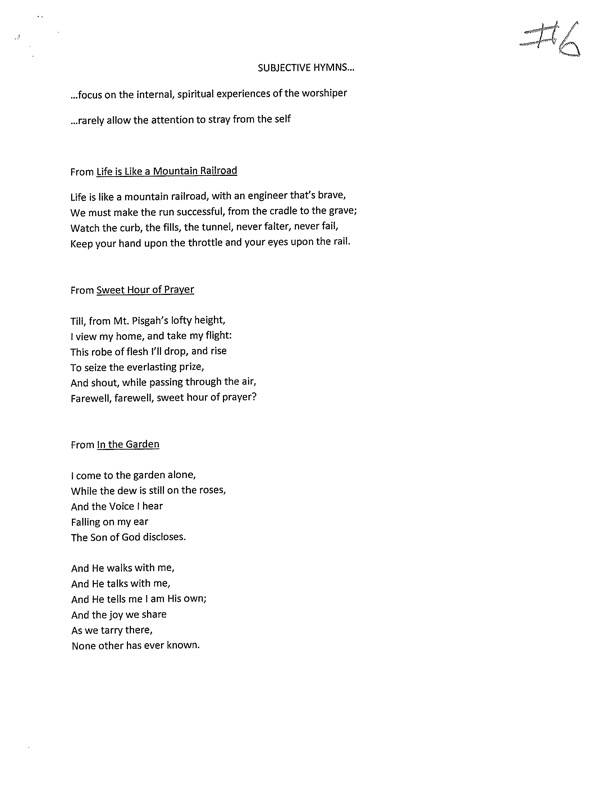
O.K. - thank you. And we can now open up for any discussion.